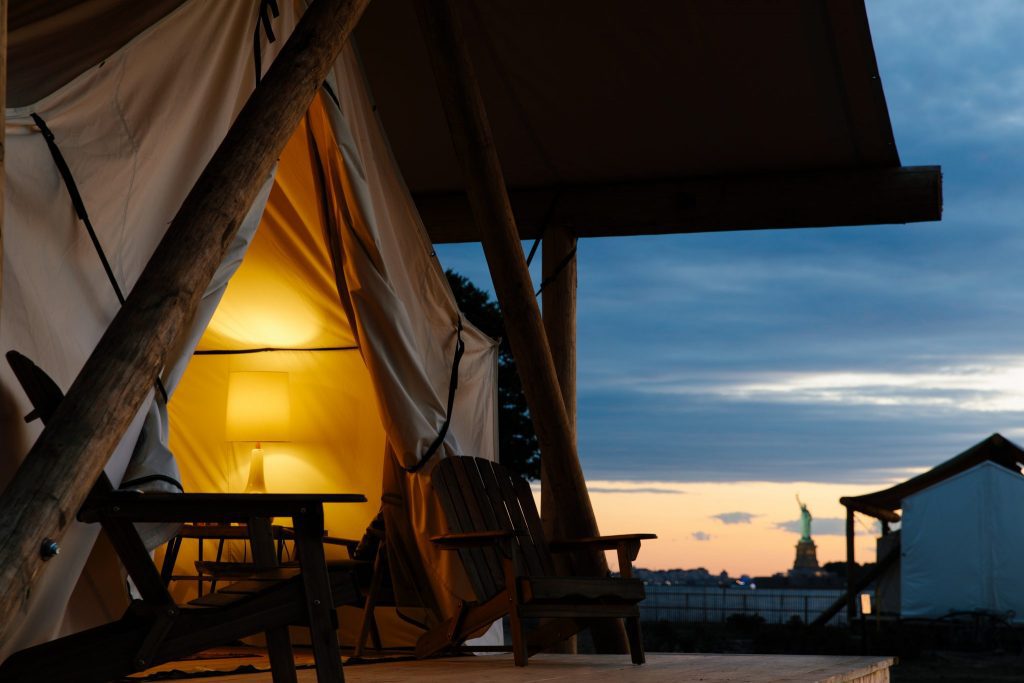Luxury Accommodations Head Outdoors in Creative Ways

Skift Take
Five-star luxury is no longer the exclusive domain of hotels and villas. The definition of luxury accommodations has expanded in scope in recent years, and now includes everything from converted shipping containers to geodesic domes to tricked-out tents, all complete with indoor plumbing. These fall under the banner of outdoor experiential hospitality, one of the fastest-growing phenomena in luxury travel.
There are plenty of advantages to having luxury accommodations without a permanent hotel. As previously reported in Skift, Luca Franco, founder and CEO of Luxury Frontiers, a design consultancy specializing in ultra-high-end tented camps, said that investors in tented projects, for example, can expect to generate 20 to 40 percent more in revenues than their high-end brick-and-mortar counterparts, and construction costs can be up to 50 percent less.
Highway West Vacations, a subsidiary of Fowler Property Acquisitions, has created the Flying Flags brand to capitalize on the profit potential and flexibility of outdoor experiential hospitality. The model is to provide a variety of alternative accommodations — from trailers to tents to tiny homes — in a single location. Meanwhile, Collective Retreats, a company that has been known for glamping tented accommodations in scenic locations around the United States, is about to introduce modular luxury suites as well.
Glamming Up an RV Park
Although located in fancy Santa Barbara County, for years the town of Buellton was known for little more than its famous pea soup. But when the movie Sideways premiered in 2004, the town received new attention as a gateway to California’s Central Coast wine country. That same year, Fowler Property Acquisitions bought the town’s very basic RV park.
After several years of operating as usual, the concept of developing the park into an upscale outdoor hospitality center was formed. That’s when Highway West Vacations came into being, according to Dan Baumann, who was the general manager of Flying Flags Buellton through 2017.
By investing millions of dollars in renovations, the campground, now called Flying Flags RV Resort & Campground, was transformed between 2012 and 2018. On-site, there are now pools, recreational facilities, and a variety of accommodation choices, including tiny houses, safari tents, Airstreams, and canned ham trailers. All units are equipped with power, cable television, Wi-Fi, and air conditioning. Prices range from the mid-200s to $400 a night on weekends.
Having the resort in town, together with the development of tasting rooms, breweries, and distilleries along Buellton’s Industrial Way, has brought in a new type of visitor, according to Kathy Vreeland, executive director of Visit Buellton.
"Flying Flags has been a huge boost to people and businesses. They have gone gangbusters over the years, developing high-end product. As they’ve upped their game, they’ve helped raise the profile of Buellton," she said.
A New Twist to Glamping
Another company experimenting with a variety of lodging options is Collective Retreats, which started operating in 2015. The asset-light company doesn’t own any property. Instead the company strikes multiyear deals with landowners to place luxury glamping tents in picturesque places, including Governors Island and Hudson Valley in New York, Vail, Colorado, and Big Sky, Montana. Aside from the accommodations, each retreat offers full-service food and beverage, housekeeping, security, and 24-hour staffing.
Retreats currently feature two types of tents. Summit tents contain a king bed or two singles and have an en suite private bathroom. Journey tents fit a queen bed or two singles and share bathrooms. Later this summer, the company is adding individual modular units to its Governors Island location, marking a brand expansion beyond tents.
The so-called Outlook Shelters are 300-square-foot, custom-designed modular units with the amenities of a standard luxury hotel room, including design-forward interiors, private en suite bathroom with rain-style shower, and indoor and outdoor living spaces.
According to CEO Peter Mack, these “fully contained units will have a light footprint on the land.” Furthermore, he notes, they can be moved to other locations (as can the tents). So when certain areas close for the winter, there is the possibility of moving units to Collective Retreats' warmer weather locations, like Texas Hill Country.
Mack, a former vice president of product design and innovation for Starwood Hotels & Resorts, said that the appeal of these types of alternative accommodations is creating a stronger connection to a location.
“I always had a strong feeling from those years working in hotels that the traditional hotel experience doesn’t authentically connect you to a place. Our brand is rooted in connections to other people, places, and themselves, as the accommodations are specifically located in areas we’ve curated. Because we’re doing things like tents and other mobile accommodations, we’re really able to take advantage of places where you can’t put a traditional hotel," he said.
Mack and company continue to look into new types of accommodations that can fit the Collective Retreats mold, and although he considers Collective Retreats a hotel company, by providing alternative accommodations, “we become less of a commodity and more of an experiential opportunity for travelers.”




